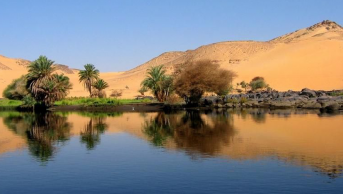Agreement over Nile? Khartoum Declaration and Ten Principles that Egypt, Sudan and Ethiopia Have Agreed Upon

In 2015, three important Nile Basin countries, namely Egypt, Sudan and Ethiopia have reached a common ground for managing transboundary water of the Nile, particularly the Blue Nile and the fate of the Grand Ethiopian Renaissance Dam. Although a final agreement has not been reached, and it would likely take numerous rounds of talks, “Declaration of Principles” (or Khartoum Declaration) appears to be a reasonable framework that all three riparians could start working for an advanced cooperative scheme. Tripartite talks in 2016 and beyond will be a real test for the Declaration.
First principle in the Declaration is the “principle of cooperation”. Cooperation will be “based on mutual understanding, common interest, good intentions, benefits for all, and the principles of international law. It will also be supplemented with a “cooperation in understanding the water needs of upstream and downstream countries across all their lands.”
Second is the principle of development, regional integration and sustainability. According to this, Ranaissance dam is perceived as a multipurpose dam with transboundary benefits: “the purpose of the Renaissance Dam is to generate power, contribute to economic development, promote cooperation beyond borders, and regional integration through generating clean sustainable energy that can be relied on.”
Third principle is “not causing significant damage”. In accordance with the customary interational law avoiding damage has been regarded as a priority among three countries: Egypt, Sudan and Ethiopia “will take all the necessary procedures to avoid causing significant damage while using the Blue Nile”. In extraordinary situations where “significant damage is caused” …., “all the necessary procedures to alleviate this damage” will be taken. Countries also agreed to discuss convenient compensation possibilities.
The fourth one, namely the principle of fair and appropriate use basically stipulates that the three countries shall use their water resources in a fair and an appropriate manner. A number of guiding elements which would ensure fair and appropriate use have also been defined as follows: a. The geographic, the geographic aquatic, the aquatic, the climatical, environmental elements, and the rest of all natural elements.b. Social and economic needs for the concerned Nile Basin countries.c. The residents who depend on water sources in each of the Nile Basin countries.d. The effects of using or the uses of water sources in one of the Nile Basin countries on another Nile Basin country.e. The current and possible uses of water sources.f. Elements of preserving, protecting, [and] developing [water sources] and the economics of water sources, and the cost of the procedures taken in this regard.g. The extent of the availability of alternatives with a comparable value for a planned or a specific use.h. The extent of contribution from each of the Nile Basin countries in the Nile River system.i. The extent of the percentage of the Nile Basin's space within the territories of each Nile Basin country.
The fifth principle is about the dam’s (Renaissance Dam) storage reservoir first filling, and dam operation policies. In his regard, the final findings in the studies recommended by the Tripartite National Technical Committee and international technical experts are important in order to reach: “a. An agreement on the guidelines for different scenarios of the first filling of the Grand Ethiopian Renaissance Dam reservoir in parallel with the construction of the dam, b. An agreement on the guidelines and annual operation policies of the Renaissance Dam, which the owners can adjust from time to time, c. To inform downstream countries, Egypt and Sudan, on any urgent circumstances that would call for a change in the operations of the dam, in order to ensure coordination with downstream countries' water reservoirs.”
The sixth principle is related to trust bulding which will involve downstream countries of Egypt and Sudan will be given priority to purchase energy generated by the Grand Ethiopian Renaissance Dam.
The principle of exchange of information and data is the seventh principle that Egypt, Ethiopia and Sudan have agreed. According to this, these countries would provide the information and data required to conduct the studies of the national experts committees from the three countries in a timely manner.
Security of the dam appeared as a separate principle, as well. The three countries declared that they would “appreciate all efforts made by Ethiopia up until now to implement the recommendations of the international experts committee regarding the safety of the dam.”
Three countries also declared that they would cooperate on the basis of equal sovereignty, unity and territorial integrity of the state, mutual benefit and good will, in order to reach the better use and protection of the River Nile. This has been drafted as the ninth principle, namely “the principle of the sovereignty, unity and territorial integrity of the State”.
Finally, peaceful settlement of disputes is the tenth principle. The three countries commit to settle any dispute resulting from the interpretation or application of the declaration of principles through talks or negotiations based on the good will principle. If the parties involved do not succeed in solving the dispute through talks or negotiations, they can ask for mediation or refer the matter to their heads of states or prime ministers.
Although these principles denote a basic and common ground for Ethiopia, Sudan and Egypt; the Nile Basin is still far away from a basin-wide cooperation. Both Sudan and Egypt are now under more pressure as the construction of the Renaissance Dam comes close to completion. On the other hand, the Cooperative Framework Agreement which was signed in 2010 by most of the Nile Basin countries, continues to be opposed by Sudan and Egypt. It remains to be seen whether the Khartoum Declaration will contribute to the Egyptian and Sudanese involvement in the Nile Basin Initiative’s broader framework.






